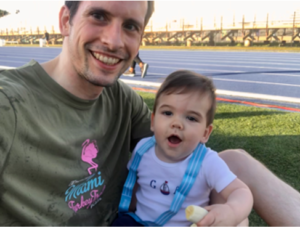See what’s on Netflix or go for a run? We’re more than half-way through #HeartMonth and I’m still picking the next episode of Netflix nine times out of ten. That said, with the Heart Month hashtags flooding my twitter feed I have been inspired to start “prescribing” exercise to patients who are having trouble making healthy exercise choices. Thanks to #cardiotwitter I also have a couple of interesting studies to show patients on the benefits of running.
One observational study at the London Marathon found an approximately 4-year reduction in vascular age associated with training for and completing the race among first-time runners. Most of these people ran 6 to 13 miles per week for the 4-5 months leading up to the race. [1] A separate, outcomes-focused meta-analysis published in 2019 analyzed data from 14 studies and found a 27% risk reduction of all-cause mortality associated with running. The authors concluded that mortality risk reduction was seen with running even just once per week. [2]
Heart disease is the nation’s leading cause of death, but it doesn’t have to be. February is American #HeartMonth to reminds us that we can fight back by making healthy choices: being active, eating healthier, and going for that occasional run.

My son and I after his first Turkey Trot last year
References:
- Bhuva A, D’Silva A, Torlasco C, et al. Training for a First-Time Marathon Reverses Age-Related Aortic Stiffening. J Am Coll Cardiol. 2020 Jan 7;75(1):60-71. doi: 10.1016/j.jacc.2019.10.045.(https://www.ncbi.nlm.nih.gov/pubmed/31918835)
- Pedisic Z, Shrestha N, Kovalchik S, et al. Is running associated with a lower risk of all-cause, cardiovascular and cancer mortality, and is the more the better? A systematic review and meta-analysis. Br J Sports Med 2019; 0:1-9. doi:10.1136/bjsports-2018-100493 (https://www.ncbi.nlm.nih.gov/pubmed/31685526)
“The views, opinions and positions expressed within this blog are those of the author(s) alone and do not represent those of the American Heart Association. The accuracy, completeness and validity of any statements made within this article are not guaranteed. We accept no liability for any errors, omissions or representations. The copyright of this content belongs to the author and any liability with regards to infringement of intellectual property rights remains with them. The Early Career Voice blog is not intended to provide medical advice or treatment. Only your healthcare provider can provide that. The American Heart Association recommends that you consult your healthcare provider regarding your personal health matters. If you think you are having a heart attack, stroke or another emergency, please call 911 immediately.”